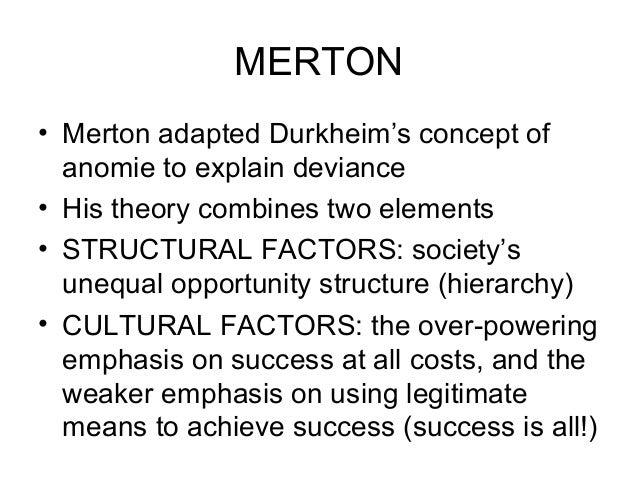Imagine a world where everyone has equal opportunities to achieve the “American Dream.” A world where hard work and dedication are guaranteed to lead to success, where wealth, status, and happiness are attainable for everyone. This idyllic scenario, however, doesn’t reflect reality. In the real world, we face societal structures that create disparities and limit opportunities. Enter Robert Merton, a renowned sociologist who, in the mid-20th century, presented a groundbreaking theoretical framework to explain this societal tension and its impact on individual behavior: Anomie theory.

Image: www.semanticscholar.org
Merton’s theory, built upon the foundation of Emile Durkheim’s earlier work, posits that societies inherently create a mismatch between culturally defined goals and the legitimate means to achieve them. This gap, he argued, breeds social strain and can lead individuals to engage in deviant behaviors, including crime. Today, Merton’s Anomie theory remains a vital tool for understanding social deviance and its impact on communities around the world.
The Roots of Anomie: Merton’s Framework Explained
Merton’s Anomie theory centers around the concept of “anomie,” a state of normlessness or a disconnect between societal goals and the means to achieve them. He proposed that society puts pressure on individuals to achieve culturally valued aspirations, like wealth, success, and social status, while not everyone has access to the legitimate means to attain them. This creates a “strain” within individuals, leading them to adapt in different ways.
Merton’s Typology of Adaptation
Merton’s theory identifies five modes of adaptation that individuals utilize to navigate this strain:
- Conformity: Individuals accept both the goals and the means to achieve them. They strive for success through hard work, education, and other socially approved channels.
- Innovation: Individuals accept the societal goals but reject the legitimate means. They turn to deviant means, such as crime or fraud, to achieve success. This mode is often associated with individuals from lower socioeconomic backgrounds who find limited opportunities for advancement.
- Ritualism: Individuals reject the societal goals but accept the legitimate means. They focus on following societal rules and procedures, even if they have little chance of achieving success. This mode is often associated with individuals who are disillusioned with the pursuit of success and find solace in following routines.
- Retreatism: Individuals reject both the societal goals and the legitimate means. They withdraw from society and often resort to substance abuse or other forms of escapism. This mode is associated with individuals who feel completely alienated from societal norms and values.
- Rebellion: Individuals reject both the societal goals and the means but actively seek to replace them with alternative goals and means. This mode is often associated with social activists who challenge the established power structures and strive for social change.
Merton’s typology offers a framework for understanding the different ways individuals respond to societal pressure. It highlights the diverse pathways to deviance, emphasizing that not everyone reacts to anomie in the same way.
Anomie in the Modern World: Contemporary Applications
Merton’s theory remains relevant in today’s world. As we grapple with issues like economic inequality, social stratification, and the pursuit of consumerist ideals, the tension between cultural goals and limited means persists. Modern societal pressures, such as the glorification of wealth and status, can fuel a sense of anomie and exacerbate existing social problems.
The #MeToo movement, for example, highlights the societal strain experienced by individuals who are disadvantaged by gender discrimination. The movement exposes the discrepancy between cultural aspirations of equality and the persistent realities of power imbalances and systemic inequality. Similarly, the rise of social unrest and protests in recent years can be understood through the lens of anomie, reflecting individuals feeling marginalized and frustrated by the lack of opportunities to achieve their aspirations.

Image: www.distudios.com
Tips for Understanding Anomie in Your Life
While complex socio-economic structures contribute to anomie, understanding its impact can empower us to create positive change within our communities. Here are some tips:
- Challenge societal norms: Question societal pressures and the messages we receive about success. Examine the underlying values and assumptions that drive our goals and aspirations.
- Promote social justice: Advocate for equality and fairness, working to dismantle systems that create barriers to opportunity for certain communities.
- Foster a sense of community: Build strong connections with others and create supportive networks to help individuals navigate the challenges of societal pressures.
By understanding the dynamics of anomie, we can promote a society that values individual well-being, promotes equality, and provides opportunities for all to thrive.
FAQ about Merton’s Anomie Theory
What is the difference between anomie and strain?
Anomie refers to a general state of normlessness, while strain specifically focuses on the tension created by the gap between societal goals and the means to achieve them.
How does Merton’s Anomie theory connect to crime?
Merton theorized that individuals who experience strain, particularly those who accept the goals but lack the legitimate means, are more likely to engage in deviant behaviors, including crime, as a way to achieve success.
What are the limitations of Merton’s Anomie theory?
Critics argue that the theory fails to fully account for the role of social factors, such as power dynamics and inequality, in shaping individual responses to societal pressures. Additionally, the theory doesn’t adequately explain deviance among those who have access to legitimate means.
Mertons Anomie Theory
Conclusion
Merton’s Anomie theory remains a powerful tool for understanding the complex interactions between societal pressures, individual aspirations, and deviant behavior. By recognizing the strain created by a disconnect between cultural goals and legitimate means, we can work to create a more equitable society that fosters individual well-being and provides opportunities for all to thrive. Are you interested in exploring the impact of anomie further, and how it manifests in your own community?

:max_bytes(150000):strip_icc()/OrangeGloEverydayHardwoodFloorCleaner22oz-5a95a4dd04d1cf0037cbd59c.jpeg?w=740&resize=740,414&ssl=1)




